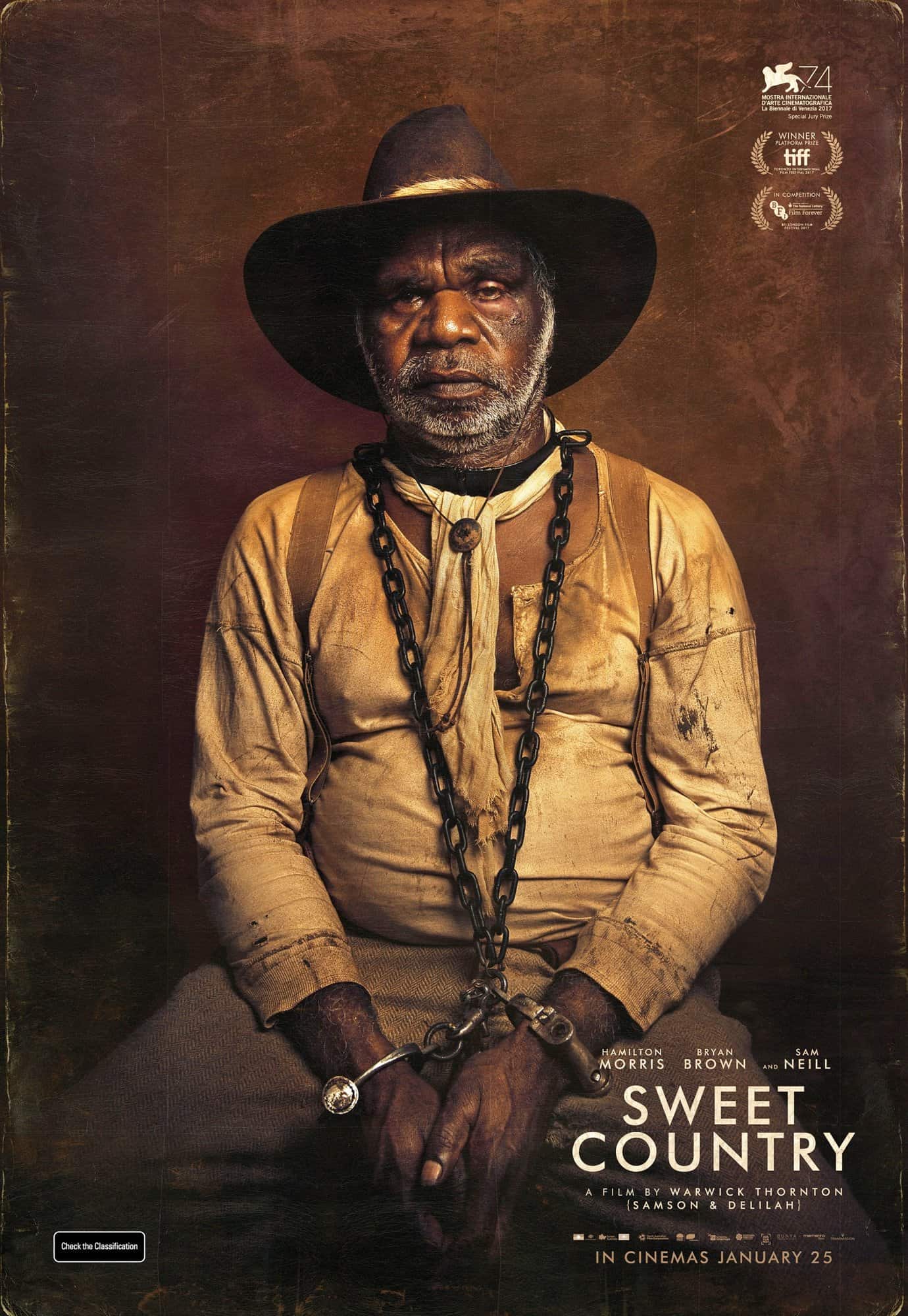A harsh tale in an otherwise beautiful land.
Many westerns offer little more than a backdrop for action set-pieces involving players good, bad, and ugly, and that’s fine, but some also take advantage of the period setting to tell a story about a country’s present. A land’s early days reveal the building blocks of its history and people alike, and while that can sometimes highlight motivations and behaviors worth praising it’s more likely to shine a light towards a shameful darkness.
It’s the late 1920s in Australia’s arid and earth-toned Northern Territory, and an Aboriginal man is on trial for his life. Sam Kelly (newcomer Hamilton Morris) has shot and killed a white man. He knows it’s self defense even as he pulls the trigger, but he also knows that won’t matter one bit. (He also doesn’t know it’s essentially an act of revenge.) That conflict makes up the core of the narrative, but smaller ones circle related by blood, sweat, and tears.
Sam, his wife, and their niece live and work on land owned by a religious-minded man named Fred Smith (Sam Neill). He’s a peaceful man blind to the differences between them but fully aware of his minority view in the world. Contrasting him is Sergeant Fletcher (Bryan Brown), a man like others with a distaste for his dark-skinned neighbors but also harboring a tired softness. Elsewhere, Archie (Gibson John) and Philomac (Tremayne & Trevor Doolan) are a pair of indigenous workers on another cruel man’s land. The elder Archie has endured a lifetime of harsh treatment after being taken from his own land as a child and has learned to obey, but Philomac is a boy stuck in a the only hell he’s ever known.
Warwick Thornton‘s latest film, Sweet Country, explores these characters’ lives around the central incident that connects them all, and while the racism and blind hate is clear throughout the hope for something better sits just beneath the surface. Its proximity may be deceptive, though, as the film’s harrowing condemnation of Australia’s history serves equally as a sadly knowing nod towards its present.
Neill and Brown are the names here, and both do strong work with their roles. Neill channels a man struggling to be optimistic in the face of so much evidence to the contrary, and his fight against apathy is an affecting one. Brown’s police sergeant seems at first to be a cookie-cutter antagonist, but he’s revealed as something more human, and Brown’s performance towards the end takes on new, unexpected pains.
The heart of the film, though, belongs to Morris and the Doolan twins. Sam is a quiet hero, one who earns our love and respect not simply through his act of violence but through what he faces both before and after that fateful gunshot. His time on the stand, faced with an imposing judge and angry townspeople, is crushing. Philomac’s only goal is survival with the understanding that cruelty and beatings come with the territory, and the Doolans’ performance, while less nuanced, strikes chords of innocence lost and surrender.
Thornton serves as his own cinematographer alongside Dylan River, and together they capture beauty amid the pain. There’s a solace to the landscape’s blend of reds, yellows, and browns, and perhaps tellingly, it’s only disturbed by the arrival of men. Equally effective here is editor Nick Meyers‘ work as the otherwise linear tale is dotted with brief flashes forward or back revealing moments that add to our understanding of various characters. For some it’s the fate awaiting them, for others it’s a quiet pause with a loved one, but each feels relevant to the character and their moment at hand. As the film builds towards the trial, something we glimpse in the opening scene, the various players and themes find greater purchase in part because of these momentary glimpses into very human lives.
Sweet Country is a harsh tale capturing both triumph and tragedy in a land more prone to the latter, and it’s not shy about what that means for the characters’ future and the land’s present.
Our review of Sweet Country originally ran during Sundance 2017, but we’re re-posting it as the film opens in limited release.

The post ‘Sweet Country’ Review: Hate and Hope Clash Against a Stunning Backdrop appeared first on Film School Rejects.
0 comments:
Post a Comment